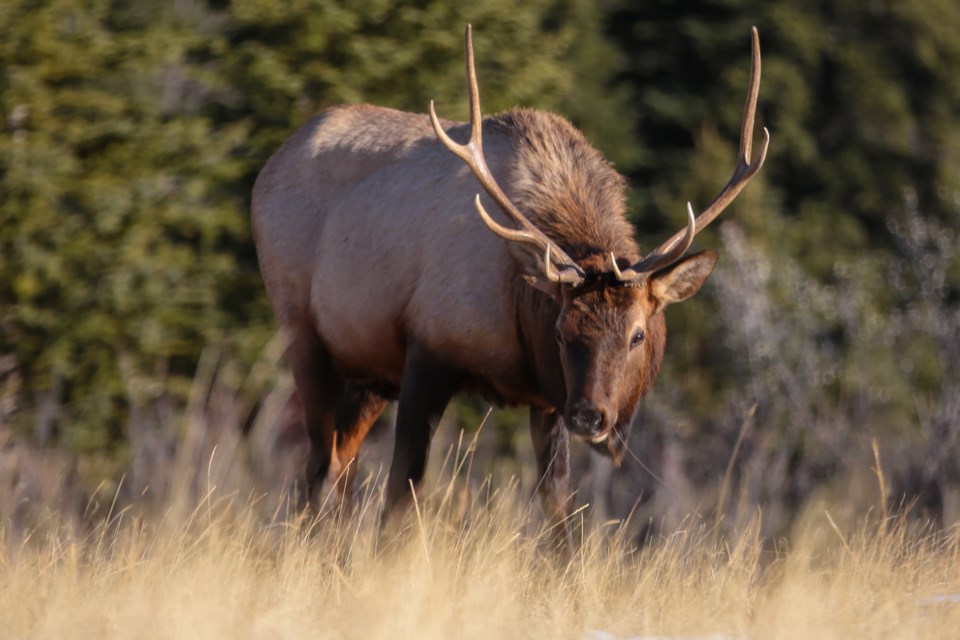The County of St. Paul council tackled the issue at its Sept. 14 meeting where they decided against taking sides after discussing a request from the AEC for a letter of support and also a letter from AFGA opposing any move by the provincial government to license harvest preserves in Alberta.
“Here we go,” Reeve Steve Upham said as he introduced the agenda item, seemingly well aware of the debate that was about to ensue.
“They (AEC) are looking to change legislation to allow for these harvest preserves in Alberta, and we’ve also received an email from the Alberta Fish and Game Association in opposition of the legalization of cervid harvesting preserves in Alberta,” CAO Sheila Kitz said.
“I reached out to a couple of my hunting buddies who are hardcore hunters to seek their input and basically they are against them for many reasons. One of them is because too much concentration of wildlife stock and too much potential for disease and if these ever get out into the wild population it would be impossible to control,” Coun. Laurent Amyotte said, adding a second concern would be the commercialization of hunting, “where only the people who could afford to hunt would be allowed to hunt in these game farms.”
While Amyotte said he is not a hunter and “doesn’t care either way,” he also said those that do raised the possibility that “in the long run it might lead to only these farms where people are allowed to hunt. Where you wouldn’t be allowed to hunt anywhere but on a game farm.”
Coun. Kevin Wirsta said he has spoken to landowners who run game ranches and they believe “it drives a huge economic development to the communities.” He said it is also his understanding that the population density on these preserves would be closely regulated “so there isn’t that overrunning of animals in a certain area . . . Most of these guys are all in favour of supporting this as it’s a long time coming. There are other provinces that allow it, so I think in my mind it’s well supported in our community anyhow.”
He said while he had spoken to a Fish and Wildlife officer who “is totally against it” for many of the reasons Amyotte outlined, Wirsta said he sees no harm with it.
“In the hunting industry today, with the amount of scope and the technology we have and using game cameras to detect your wild game, it’s no difference than hunting in a fenced area of 300 acres.”
“Oh, it’s a little different,” Amyotte responded, “because these animals are pail-fed so they are more like pets than they are wild animals . . The American hunters that come up here, they pay $10,000 – so if I was rancher wanting to go into a game farm, I would certainly be for it. Just like the guys that’s sending us the letter – he owns one of these, he happens to be president of the association.”
In his letter, AEC president John Cameron, who operates an elk and bison ranch near Winfield, maintained the province’s game ranchers are not competing on an equal playing field given that hunting preserves are legal in Saskatchewan.
“This places our industry at a competitive disadvantage and causes us to lose both direct revenues from harvesting animals in Alberta and many associated economic benefits,” Cameron stated.
Meanwhile, in his letter AFGA president Victor Benz said the organization maintains game ranching is in direct conflict with the conservation of wild cervid populations and suggested the introduction of Chronic Wasting Disease (CWD) in the province was a direct result of the start of game ranching in the early 1990s.
“The Alberta Elk Commission would expect wealthy clientele to pay for access to land where trophy elk are bred and raised in a pseudo-agricultural environment. If this was permitted, it is but a small step to allowing paid access for hunting on all private land in this province,” Benz noted in his letter.
“The way the agriculture, everything is going, farmers keep on losing money every year, every year. If this is a way that some farmers if they started a game farm could make some extra money, I think it’s great.” Coun. Dale Hedrick said.
“Well, it was our government who pushed us to think outside the box and create new farming incomes. They are the ones that bought in the ostrich, the elk, the deer, the whole bit,” Wirsta said.
“The thing about this is it is going to benefit a select few,” Coun. Cliff Martin noted.
Coun. Maxine Fodness said she felt that there was some benefit on both sides of the issue, but pointed out when hunters come into the area now there is a benefit to the community already.
“Hunting is hunting. Hunting isn’t going into an enclosed fence and knowing that you’re going to bag some meat.”
Upham said it is a contentious issue with valid arguments on both sides and ultimately council agreed to not take sides and, instead, accepted both letters as information.



